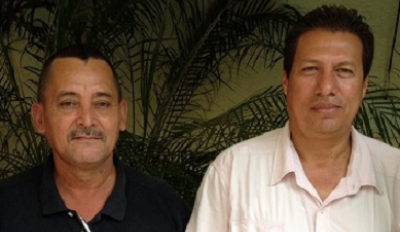
On March 16th and 17th, 2016, members of the U.S. House of Representatives sent letters to U.S. Secretary of State John Kerry on two separate cases that illustrate the dangers faced by Honduran labor and human rights defenders. In letters endorsed by the AFL-CIO, the Representatives called upon the State Department to take specific, concrete actions to address the situation of activists in Honduras, who are regularly threatened, attacked and assassinated for the brave work they do.
In the March 16th letter, 23 members of Congress led by Representatives Kaptur and Johnson call for action on threats against Honduran trade unionists Nelson Nuñez and Tomás Membreño Pérez.
In November 2015, Nelson Nuñez had to flee his home along with his family after they had been monitored for weeks by unknown men in a black pick-up truck without license plates. Tomás Membreño Pérez, his colleague in the trade union federation FESTAGRO (an ILRF partner organization), had received multiple death threats in August and September 2015. The anonymous messages ordered him to stop his support of banana and sugar cane workers who were organizing for better working conditions.
In January 2016, advocacy by ILRF supporters and allies prompted 30 members of Congress to call for action from Honduras on the threats against FESTAGRO leaders. But by March, these cases had yet to be investigated, and the trade unionists were not getting the protection they needed.
The Honduran government is required to uphold basic labor and human rights protections under CAFTA and U.S. foreign assistance legislation, respectively. They have repeatedly failed to enforce the law, yet have faced no meaningful consequences from the U.S. government.
After over 1,600 ILRF supporters contacted their members of Congress, the group of concerned Representatives sent the follow-up letter to Secretary Kerry on March 16th. This forceful new letter urges Kerry to push the Honduran authorities to publicly condemn the threats, arrange for the trade unionists’ private protection, document concrete progress made on their cases, and strengthen the fight against impunity in order to address the root causes of violence against human rights defenders.
The 23 Representatives signing the letter requested "a detailed record of all Embassy personnel’s contacts with the Honduran government regarding the security of or the threats against these trade unionists, including the name and position of the official, the issues discussed, the requests made by the Embassy, the response from the Honduran officials, planned follow up action, concrete measures and the dates on which they are or will be implemented."
The Representatives stated that "calling on the Honduran government in a public forum to condemn the threats would send a clear message that the plight of the unionists and the workers they represent is not acceptable."
Such a tough Congressional message has the potential for real impact at a critical moment. The assassination of Berta Cáceres, a world-renowned Honduran environmental and indigenous rights activist, on March 3, 2016 has been met with strong global condemnation and appeals for justice, including a call by a prominent Vatican cardinal for “an independent and impartial investigation.”
A powerful letter on Berta Cáceres’ death signed by 62 representatives was also sent to Secretary Kerry on March 17, 2016. The Cáceres letter demands an independent international investigation of her murder. Significantly, it also calls for broader changes that have long been supported by international solidarity organizations, which could help prevent future acts of violence against human rights defenders in Honduras.
The release of these two Congressional letters in the same week demonstrates that more U.S. policymakers are watching closely and expecting Honduras to address the escalating risks for activists across the country.
Honduras is the most dangerous place in the world to be an environmental activist, and rights defenders, including trade unionists, continue to face violent attacks for the courageous work they do. The country has seen the assassinations of hundreds of environmental, indigenous, LGBTI, labor and other human rights defenders since 2009, most of which remain in impunity.
International pressure is critical to ensuring the safety of Berta Caceres’ allies in the Honduran social movement, who honor her memory by continuing to fight for the rights of all marginalized communities.
See below for the full text of both letters sent to Secretary Kerry, in English and Spanish.
